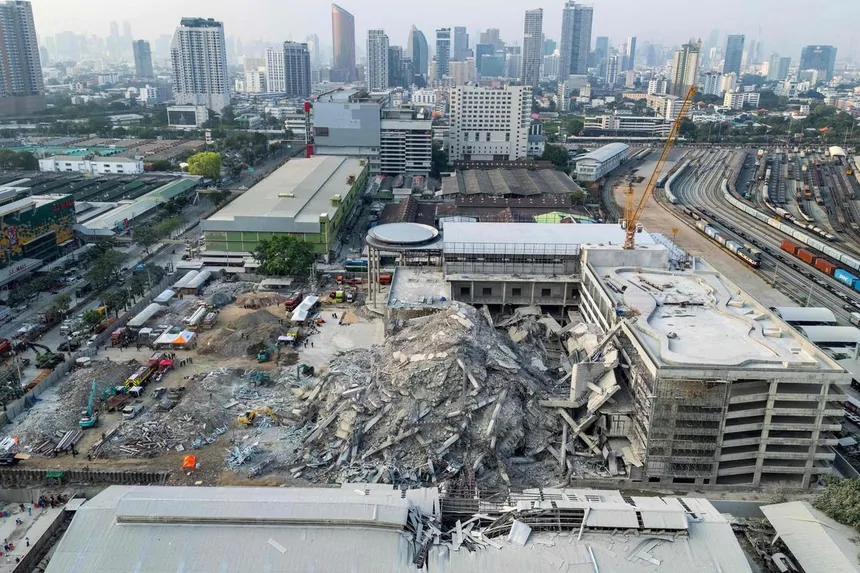It was meant to be a showcase of Chinese engineering prowess abroad. Instead, it has become a symbol of disaster.
A towering structure built by China Railway No. 10 Engineering Group collapsed on March 28 after a powerful earthquake struck the region. The unfinished 137-meter high-rise, intended to house Thailand’s state audit office, came crashing down, leaving a trail of debris, unanswered questions, and growing public outrage.
More than 100 workers were at the site when the building fell. Nineteen deaths have been confirmed in Thailand so far, 12 of them from the collapse. Seventy-five remain unaccounted for. Rescue teams continue to dig through the rubble.
In the days leading up to the disaster, the Chinese state-owned contractor had proudly promoted the project on its social media channels. A sleek video posted on Douyin, China’s version of TikTok, showed sweeping drone shots of the glass-clad skyscraper. A red banner fluttered from the top, marking the “topping out” milestone—a declaration that the structural framework was complete.
Hours after the collapse, the promotional materials vanished from the company’s pages.
The Bangkok high-rise is the only building in the Thai capital to suffer a total structural failure from the quake, fueling criticism about construction quality and the process by which government contracts are awarded. Local media have been flooded with questions: Why did this building fail when others stood firm? Who approved the materials and oversight? And what role did the contractor’s ties to China play in securing the deal?
China Railway No. 10 is a junior partner in the project, working alongside Italian-Thai Development (ITD), a major local construction firm. While ITD has long been a fixture in Thailand’s infrastructure sector, the Chinese company, a subsidiary of China Railway Engineering Corporation, holds a 49% stake—the maximum allowed under Thai law for foreign-owned enterprises.
For many Thais, the collapse has heightened concerns over Beijing’s growing footprint in the country’s economy. China is Thailand’s largest source of foreign direct investment, pouring in over a quarter of total FDI in 2023. Chinese firms have secured major government contracts, particularly under the previous administration of General Prayut Chan-o-cha, who ruled after seizing power in a 2014 military coup.
The timing of the disaster has only deepened anxieties. The earthquake struck just weeks after Thailand deported 40 Uighur detainees to China, a move widely condemned by human rights groups. Some see the building collapse as yet another reminder of Thailand’s increasingly complex relationship with Beijing.
Prime Minister Paetongtarn Shinawatra has vowed accountability. She has ordered a formal investigation into why the building failed while others withstood the quake. The Ministry of Industry has begun testing construction materials, focusing on the steel bars used to reinforce the structure’s concrete foundation.
Deputy Prime Minister Anutin Charnvirakul, who is overseeing rescue operations, has pledged that both the Thai and Chinese firms will be held responsible. Meanwhile, Thai police have detained four Chinese nationals for allegedly trying to remove documents from the disaster site in violation of emergency protocols. Local media published photos of the men caught in the act, struggling to carry stacks of binders away from the wreckage.
Neither ITD nor China Railway No. 10 have publicly addressed allegations of construction flaws. In a statement to the stock exchange, ITD expressed condolences to the victims and promised cooperation with authorities. China Railway Group, the parent company, has remained silent.
Pravit Rojanaphruk, a well-known Thai journalist, has called on Beijing to acknowledge the incident and cooperate fully with the investigation. “The Chinese government cannot act as if this has nothing to do with them,” he wrote in a Facebook post. “That will only deepen the backlash against China.”
For now, the search for survivors continues. So does the search for answers.
etruth.mv/

